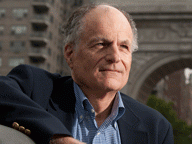School News
—
Vice Chair of NYU Trustees & Chair of the Board of Overseers William R. Berkley is profiled
—

Excerpt from Risk and Insurance -- "William R. Berkley has been in the insurance business ever since he launched his company with $2,500 out of Harvard's business school in 1967. That means he's been playing the property/casualty coverage game for nearly 45 years."
School News
—

Excerpt from Risk and Insurance -- "William R. Berkley has been in the insurance business ever since he launched his company with $2,500 out of Harvard's business school in 1967. That means he's been playing the property/casualty coverage game for nearly 45 years."



















